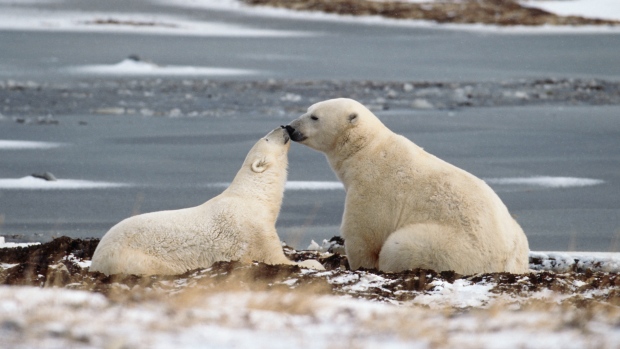
News Update November 2016
Doug Clark featured in Arctic Resilience Final Report; Graham Strickert discusses work connecting science and art with Yukon College students; Grant Ferguson talks Husky Oil spill with the media.
News
- Warm temperatures eroding Rocky Mountain glaciers - The Crag and Canyon, John Pomeroy
- How to stop human-made droughts and floods before they start - Concordia University, Howard Wheater
- 'These things are more likely to happen': Collapsing banks growing more common along North Saskatchewan, geoscientist says - Regina Leader-Post, Grant Ferguson
- Husky report finds ground movement caused spill in North Saskatchewan River - Global News, Grant Ferguson
- U of S professor discusses Husky claim that pipeline burst was a sudden one-time event - NewsTalk CJME, Grant Ferguson
- University of Saskatchewan engineer says cause of Husky oil spill not a 1-time event - CBC Saskatoon, Grant Ferguson
- Study shows Alberta's rivers under threat due to climate change - Calgary Herald, Ali Nazemi
- U of S research finds good news for Saskatchewan’s woodland caribou - PA Now, Jill Johnstone
- North Sask. caribou population bucks national trend - USask News, Jill Johnstone
- Flood resilience increasing as jurisdictions co-operate: ARBI - Manitoba Co-operator, GIWS & GWF
- Climate change causing dramatic Arctic shitfts, scientists say - CBC News, Doug Clark
- Yukon College art students tell the story of climate change science - Maclean's, Graham Strickert
Announcements
Robert Patrick Speaks on Water StewardshipAt the North American Lake Management Society 36th International Symposium held in Banff, AB, Nov 1 - 4, GIWS member Robert Patrick presented a paper in the First Nations Management of Land and Water session. The paper was titled "Saskatchewan River Delta: Water Stewardship Planning Initiative."
AGU Student Events
The American Geophysical Union 2016 Fall Meeting, taking place December 12 - 16 in San Francisco, CA, is hosting a number of events organized by the Hydrological Section Student Subcommittee, including:
- Student and Early Career Scientist Conference
- Pop-Up Talks
- Community Service Activities
- Meet Your Hydrology Section Student representative
- Student Lounge
For information on those activities which do not have accompanying links, please visit the AGU website.
Working in Canada's North Photo Competition
Do you have pictures from working in Canada’s North? Whether it’s research in action, showing off scientific tools, illustrating life in the field, or scenic landscapes of scientific importance, we want to see your photos and learn the story behind them. Submit your photos for a chance to be published on the Canadian Geographic website and featured in a special exhibition of the Government of Canada's Polar Continental Shelf Program.
NSERC Science Action! Contest
The Natural Sciences and Engineering Research Council of Canada is hosting Science Action!, a contest aimed at promoting NSERC research through short, entry-submitted video clips. The contest offers entrants a chance to win one of 15 cash prizes for your short, creative video that will get Canadians excited about science and engineering research.
Weekly Smudge Sessions at Gordon Oakes Red Bear Student Centre
Every Monday when classes are in session this term at 9:30 am, Elder Louise Halfe will be leading a smudge ceremony in the Gordon Oakes Red Bear Student Centre. Everyone — students, faculty and staff — are welcome to attend and participate.
Elder Louise Halfe is a former Poet Laureate of Saskatchewan, an alumna of the U of S, a member of the Indigenous Health Committee and a respected Elder who brings Cree and Métis teachings.
U of S geoscientist and GIWS member Grant Ferguson was featured prominently in the news this past week, wherein he discussed this summer's Husky oil spill in Saskatchewan with several media outlets. Specifically, he put forward that these kind of incidents can become more likely as ground shifts and banks collapse.
Grant's comments can be found in the Regina Leader-Post, CBC Saskatoon, Global News and NewsTalk CJME.
Stopping man-made droughts and floods before they start
Ali Nazemi and Howard Wheater were featured by Concordia University in an article on their research into preventing man-made droughts and floods.
The pair were among several researchers who co-authored a paper on flooding and drought patterns, titled "Forms and drivers of annual streamflow variability in the headwaters of Canadian Prairies during the 20th century," which was published in Hydrological Processes. The article can be read in full here.
ESAC Call for Members
You are invited to join the Environmental Studies Association of Canada (associated with Alternatives Journal). The association has a meeting/conference at the Congress for Social Sciences and the Humanities every year. For more information on membership costs and benefits, visit its website. Any further questions can be directed to Garrett Richards, ESAC executive.
Minister Morneau Invites Post-Secondary Students to Build a Stronger Canada
To give post-secondary students the chance to showcase their public policy ideas on a national stage and play the role of policy advisor to the federal government, Minister of Finance Bill Morneau today announced the launch of his Post-Secondary Policy Forum. The Forum will offer tomorrow's public policy leaders the opportunity to guide the Government's efforts as it advances its bold plan that puts people first and delivers the help middle class Canadians need to prosper and grow the Canadian economy. Learn more here.
ESAC Memberships on Sale
The Environmental Studies Association of Canada is offering 22 per cent off all memberships until the end of 2016. Full details, including a breakdown of membership benefits, can be read here.
Immigration Changes and Immigration Website Issues
Effective Nov. 19, Immigration, Refugees and Citizenship Canada (IRCC) will enforce significant changes that may affect international research employees and Post-Doctoral Fellows (PDFs) who work at the university. Until now, these individuals did not often meet the criteria for permanent residency through the Saskatchewan Immigrant Nominee Program (SINP). We are hopeful that they will now be eligible for permanent residency, because of these changes.
As of Nov. 6, the IRCC website and Employer Portal that is used to submit mandatory compliance fees and forms has been unavailable. Employers are required to use this channel to process employment information for positions such as PDFs, Visiting Professors and Business Consultants, before these foreign workers can apply for work permits at the border, Embassy or Visa offices abroad. IRCC is working to restore the Employer Portal but no estimation has been given as to when it will be functioning. We are monitoring this situation closely and will continue to directly contact those people affected by this service disruption.
Please direct any questions or concerns about immigration matters to Katharine Fahlman-Smith, Global Mobility Specialist, at 306-966-6635.
A report on the disruption of global climate and ecosystems, featuring the work of GIWS' own Douglas Clark, was launched in Stockholm, Sweden, on Nov. 25.
This Arctic Resilience Final Report is the concluding scientific product of the Arctic Resilience Assessment, a project launched by the Swedish Chairmanship of the Arctic Council. The report builds on decades of research on social-ecological resilience, and in particular on a growing body of knowledge on the Arctic. Clark is the author of two of the report's chapters, which can be read in full here.
An article featuring the report can be read here.
Graham Strickert's work in Yukon featured by Maclean's
Maclean's recently covered a collaboration between the Yukon College school of visual arts, its Yukon Research Centre and the University of Saskatchewan. The project, called Changing Landscapes and Northern Ways of Life, is meant as a way of bringing together scientists and northern communities to record the impact of climate change through artistic expression.
GIWS' own Graham Strickert, who is helping to lead the project, was tapped to comment for the story, saying, "We are trying to synthesize what the physical scientists and traditional knowledge holders have observed." The piece can be read in full at Maclean's.
Notice on Spread of Zebra Mussels
As of Nov. 24, zebra mussels have been found in Montana reservoirs and the Missouri River. Alberta has also indicated that a bridge abutment over the Milk River has zebra mussels, it is believed that it was contaminated by movement of aquatic field equipment. A notice has gone out urging caution with equipment used in field work. Make sure watercraft have been Cleaned, drained and dried and that field gear is either only used on that body of water, has been cleaned or is new. Once dried it takes five days before watercraft can be moved. Further details can be found in the accompanying document.
